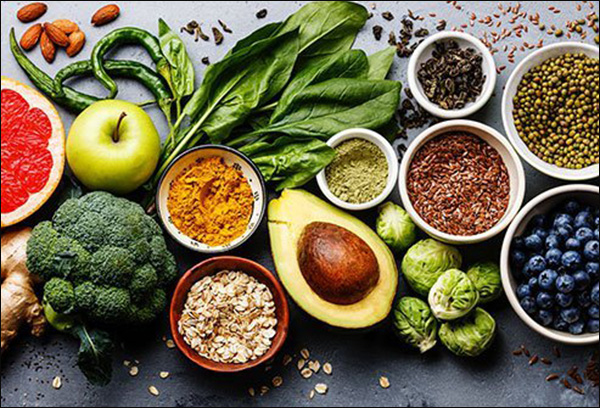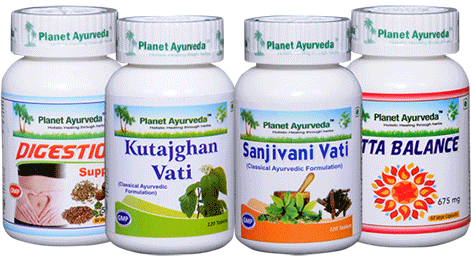Herbal Alternatives to Pantoprazole/Omeprazole – Gas And Acidity
ABSTRACT
The problems related to the stomach are getting more and more common. The main credit goes to the food we eat. One of the most common problems faced by today’s population is acidity and gas. Haveyou ever thought about what causes acidity or gas? Have you ever noticed which food article has irritated your stomach or intestine? Have you ever thought to totally avoid intake of things causing trouble to your digestion? The main problem with human beings is that they respond when the damage is done but will not take care of things before. In this article we will discuss drugs like Pantoprazole/Omeprazole which are being prescribed in various digestive issues and what are the best alternatives to these medications in Ayurveda.
INTRODUCTION
The pantoprazole/Omeprazole is two proton pump inhibitors which are given in various types of digestive conditions. Mostly these two drugs help in subsiding the acidity problems, acid reflux problem and also help in infection based acidity like in case of helicobacter pylori or H.pylori infections. They are also given in duodenal and stomach ulcers as well. The drugs are given to both children and adults. Pantoprazole and omeprazole tablets come with a delayed release capsule, tablet and suspension. They even come in the form of IV injections. These drugs are generally prescribed as a short term treatment.

Key Highlights
- Pantoprazole and omeprazole are proton pump inhibitors
Pantoprazole
- It is used to treat erosive esophagitis associated with GERD
- Maintenance of healing of erosive esophagitis.
- It is also given in pathological hypersecretory conditions including zollinger ellison syndrome.
- Marketed in 2000 under brand name protonix
Omeprazole
- It is given in duodenal ulcer
- Choice of drug in H.pylori
- Given in Gastric ulcer and also for GERD
- It is prescribed to paediatrics patients as well.
- Marketed in 1989 under brand name prilosec
Purpose of prescribing a proton pump inhibitor?
- The proton pump inhibitors, as mentioned before, are generally prescribed to decrease the amount of acid produced in the stomach.
- They help in reducing acid reflux. Acid reflux is something that happens due to the upward movement of food or liquid.
- The use of proton pump inhibitors is also done in ulcers. In Stomach ulcers these drugs are generally prescribed.
- In infections like helicobacter pylori use of PPIs is common.
The main purpose in every situation is to reduce the production of acid in the stomach.
Now moving further let’s understand the working of Proton pump inhibitors
How do proton pump inhibitors work
- So, let’s understand this working in the most simplest way. Our stomach normally produces acid to help the digestion of food and also help in killing germs or bacteria. This acid is corrosive in nature and to counter this corrosive property of stomach acid, there is the barrier of mucous in the stomach that helps in protecting the stomach from getting worn away.
- In certain people this barrier breaks down thus the situation allows the acid to damage the stomach or erode it or result in the formation of ulcers. In some other cases there might be some problem with the sphincter, the sphincter is like a cap placed at the top of the stomach. This helps in keeping the stomach tightly closed and the content of the stomach inside. But when the sphincter muscles gets weak then it is not able to close properly and this allows acid to to reflux back. This refluxed back acid can damage the lining of the oesophagus thus causing situations like heartburn and inflammation of gullet.
- As mentioned before PPIs help in reducing the acid production in the stomach thus preventing ulcers and esophageal irritation. The proton pump inhibitors are called proton pump inhibitors because they work by blocking or inhibiting the chemical system called the hydrogen potassium adenosine triphosphatase enzyme system or simply called proton pump. The cells in the stomach lining have this chemical system. These cells in the stomach lining are responsible for producing acid.
- As mentioned before PPIs help in reducing the acid production in the stomach thus preventing ulcers and esophageal irritation. The proton pump inhibitors are called proton pump inhibitors because they work by blocking or inhibiting the chemical system called the hydrogen potassium adenosine triphosphatase enzyme system or simply called proton pump. The cells in the stomach lining have this chemical system. These cells in the stomach lining are responsible for producing acid.
Side effects/Adverse effects of Pantoprazole/Omeprazole
Side effects of Pantoprazole/Omeprazole are divided into two parts based on their short term and long term use.
Firstly, we will start with side effects or Adverse effects of short term use of Pantoprazole/Omeprazole.
- Short term use of Pantoprazole/Omeprazole or proton pump inhibitors result in headaches followed by dizziness.
- A person can experience some gastrointestinal symptoms like nausea, abdominal pain followed by flatulence, constipation and diarrhoea. Symptoms on skin include the appearance of rashes.
- The Gastrointestinal symptoms may also induce severe lack of appetite and weight loss at last.
Next, coming on to the side effects due to long term use of Pantoprazole/Omeprazole
- The long term use of Pantoprazole/Omeprazole results in the increased risk of bone fracture. This only happens if a person is taking multiple doses of Pantoprazole/Omeprazole per day for a duration of more than a year.
- There are possible chances of vitamin B12 deficiency which in turn leads to serious nerve damage and also results in the deterioration of brain functions.
- There is chronic inflammation of the stomach’s lining.
- There is a significant lack of magnesium. This is most common in people taking pantoprazole.
- When hospitalised and treated with pantoprazole, patients can suffer from clostridium difficile bacteria infection.
- Though the allergic reactions are rare, pantoprazole can cause allergic responses in the body.
- Moreover PPIs can cause cutaneous lupus erythematosus and systemic lupus.
Even beside the drastic effects of Pantoprazole/Omeprazole, people use them blindly and later on their body is prone to too many conditions. You might be thinking, then what to do, what to have if not Pantoprazole/Omeprazole?
The answer to this question is simple and its Ayurveda.
- Ayurveda is a science that describes how one should live a healthy life and if someone faces any difficulty then how it can be solved. That’s the beauty of Ayurveda. This science does not believe in subsiding the or suppressing the symptoms but it believes in the elimination of disease from the body. Yes, that sounds difficult and indeed it is difficult because it requires efforts from both sides, that is from the physician’s side of the physician as well as from the side of the patient as well. These efforts include following all the dietary changes, managing a proper lifestyle and having herbal formulations, which will correct the disbalance going on inside your body.
- Many of the readers might know and many of the readers might not know that there are three energies of the body that are responsible for maintaining the whole body system. These three energies are potential energy or kapha dosha, thermal energy that is pitta dosha and kinetic energy which is vata dosha. Any imbalance in any of these three energies will definitely cause some symptoms in the body. Excessive production of acid in the stomach is one of such symptoms and is due to imbalance in the thermal energy of the body.
Herbal remedies by Planet Ayurveda as an alternative to Pantoprazole/Omeprazole
Planet Ayurveda is an ISO certified company which is also having certification of HALAL, KOSHAR, FDA and others. The herbal preparations manufactured by Planet Ayurveda are in the form of tablets (vati), capsules, syrups, decoctions (kwath), jams (avaleha) and others. The products prepared by Planet Ayurveda are totally herbal and do not contain any type of adulterants, fillers, dyes, flavour enhancing agents, binders etc. The herbal preparations manufactured or prepared by Planet Ayurveda are potent and are used in various types of conditions. The formulations offered by Planet Ayurveda as an alternative to Pantoprazole/Omeprazole are as follows:
- HEART BURN CAPSULES
- DIGESTION SUPPORT
- AMALAKI RASAYAN
- MAHASHANKH VATI
Product Description
1. HEART BURN CAPSULES
Heartburn capsules as their name suggests are typically for managing the heartburn which is quite common in patients who are having excessive acid production in the stomach along with weak sphincter muscles. The product has ingredients like Praval Pishti (coral calcium), Akik pishti (agate calcium), mukta pishti (Pearl calcium) and Ayurvedic calcium compounds like jahar mohra pishti and kamdudha ras. All of these ingredients are having cold potency that is opposite to the thermal energy inside the body. Due to this cold potency they are likely to balance the excess of pitta dosha in the body. This results in reduction in the production of stomach acid and thus symptoms like heartburn are solved.
Dosage: One capsule twice a day after meals with lukewarm water.
2. DIGESTION SUPPORT
Digestion support is a herbal formulation which is manufactured with nature’s best herbs for all kinds of digestive system related problems. The ingredients of this formulation are amla (Emblica officinalis), Haritaki (Terminalia chebula), bahera (Terminalia bellerica), saunf (Foeniculum vulgare), Dhania (Coriander sativum), pippali (Piper longum) and Jeerak (Cyminum cuminum). As the name suggests the digestion support capsules are specifically prepared with a combination of herbs that can help in supporting the digestive fire and also helps in balancing the disbalance going on inside the body. Having digestion support not only ignites or balances your digestive fire but also prevents your body and other organs from various kinds of diseases.
Dosage: One capsule twice a day after meals with lukewarm water.
3. AMALAKI RASAYAN
Amalaki rasayan is a rasaynik formulation that has only Amalaki (Emblica officinalis) as its ingredient. Amalaki is known to improve appetite and taste as well. As an alternative to Pantoprazole/Omeprazole, amalaki rasayan helps in maintaining the acid production in the stomach by balancing the pitta dosha or thermal energy of the body. As now we know that excess acid production can cause loss of appetite, anorexia, lack of taste etc. but with Amalaki rasayan these conditions can be improved. Amalaki rasayan corrects the gastrointestinal symptoms caused due to the short term use of Pantoprazole/Omeprazole. The formulation can be given in case of ulcers and acid peptic disorders as well.
Dosage: One capsule twice a day after meals with lukewarm water.
4. MAHASHANKH VATI
Mahashankh vati is a really effective classical herbomineral formulation which is mainly used in all kinds of digestive troubles. The formulation has ingredients like shunti (Zingiber officinalis), Pippali (Piper longum), Shankh bhasma (Calx of conch shell) and many others. The formulation has its impact on improving the digestion and thus gives very great and effective results. As an alternative to Pantoprazolea and Omeprazole, the formulation fits best as it helps in getting better without causing other gastrointestinal symptoms. Mahashankh vati is safe to be used in ulcers, acid peptic conditions and has healing effects. It helps in rejuvenation of gastrointestinal mucosa
Contact Planet Ayurveda Support Team to provide you the costing / ordering and delivery information at – costing.planetayurveda@gmail.com or Call at 0172-521-4030 (India), +91-172-521-4030 (Outside India) or Whatsapp at (+91) 9915-593-604.
Conclusion
People these days want everything instant weather food, affection or results from medicines. But we never think that instant things come with a price and that price is well paid by our body. Long term or short term some medicines tend to show results on your body and these results are mostly negative. But with herbal medicine such effects are never seen. Herbal formulations are given to correct one thing but at last ends up correcting many more. That is the beauty of herbal products. The formulations which are mentioned above are totally herbal and prepared from the natural extract of herbs. There is no addition of chemicals, preservatives, starch, additives, colours, yeast, binders, fillers and flavour enhancers etc. In addition they give great results as an alternative to Pantoprazole/Omeprazole.





